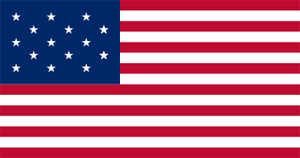War of 1812 Battles |
Colonial Wars |
American Wars |
Battle of Baltimore
September 12-14, 1814 Baltimore, Maryland
Books on The Battle of Baltimore are available from Amazon.com
 |
|||||||||||||||||||||
|
In the Battle of Baltimore, one of the turning points in the War of 1812, American forces warded off a combined British land and sea invasion of the busy port city of Baltimore. The American defense of Baltimore's Fort McHenry in this battle inspired Francis Scott Key to compose the poem which would become the national anthem of the United States, The Star Spangled Banner.
In August 1814, the British army had overrun confused American defenders at the Battle of Bladensburg and marched into the nation's capital of Washington, D.C.. After burning and looting major public buildings there and forcing President James Madison to flee, they turned their attention north to Baltimore, where they hoped to strike a knockout blow against the demoralized Americans. Baltimore was not only a busy port, but was thought by the British to harbor many of the privateers who were despoiling British ships. The British planned a combined operation, with Maj. Gen. Robert Ross launching a land attack at North Point, and Vice Adm. Alexander Cochrane laying siege to Fort McHenry, which defended the harbor.
The British army of 5,000 landed as planned, marched toward Baltimore, and first met heavy resistance at the Battle of North Point, where Ross was mortally wounded on September 12. Col. Arthur Brooke took over the command, pushed the American defenders back, and advanced to within two miles of the city. The city's defenses were under the command of Maj. Gen. Samuel Smith,an officer of Maryland militia and also a United States Senator. Baltimore had been well fortified, with excellent supplies and some 15,000 troops. Brooke knew that the success of his attack depended upon receiving reinforcements and assistance from the British Navy. He therefore halted his advance and awaited the results of the sea campaign.
At Fort McHenry, some 1000 soldiers under the command of Maj. George Armistead awaited the British naval bombardment. Their defense was augmented by the sinking of a line of American merchant ships at the adjacent entrance to Baltimore Harbor in order to further thwart the passage of British ships. The attack began on the morning of September 13, as the British fleet of some nineteen ships began pounding the fort with rockets (from rocket vessel HMS Erebus) and mortar shells (from bomb vessels Terror, Volcano, Meteor, Devastation, and Aetna).
After an initial exchange of fire, the British fleet withdrew just beyond the 1 1/2 mile range of Fort McHenry's cannons, and continued to bombard the outmanned Americans for the next 25 hours.
After nightfall, Cochrane ordered a landing to be made by small boats to the shore just west of the fort, away from the harbor opening on which the fort's defense was concentrated. He hoped that the landing party might slip past Fort McHenry and draw Smith's army away from the main British land assault on the city's eastern border. Operating in darkness and in foul weather, this diversionary attack failed. On the morning of September 14, an oversized American flag, which had been hastily sewn in hopes of this event, still flew over Fort McHenry, and Cochrane and Brooke knew that victory had eluded them.
In the aftermath of the battle American lawyer Francis Scott Key, who watched the proceedings from a truce ship in the Patapsco River, was inspired to write the poem which eventually would become the national anthem of the United States, "The Star-Spangled Banner." Meanwhile Col. Brooke's troops withdrew, and Admiral Cochrane's fleet sailed off to regroup before his next assault on America at the Battle of New Orleans. Armistead was soon promoted, to Lt. Colonel. Much weakened by the arduous preparations for the battle, he died at age 38, only three years after the battle.
